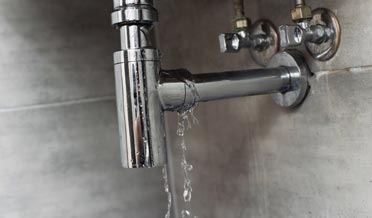Identifying Plumbing Repairs in Your Home
Even tiny drops of water, over time, can change the rock forever.
Veronica Roth
Water leaks are particularly troublesome because small amounts of water, combined with time, create significant damage. Whenever a leak goes undetected, the damage can accumulate and compound with disastrous results. Here are plumbing repairs signs to look for to detect leaks around your home.
Plumbing Repairs: Coloring Water Leaks
- Fresh water is simply called potable water. Faucet drips are annoying and expensive—you are paying for the accumulated drops that leak away. However, fresh water is under pressure, so a leak in a joint or weak spot will often be a spray and widen the leak over time.
- Grey water is water that drains away from washing applications, such as sinks, tubs, showers, washing machines, and dishwashers. It may also include food particles, grease, and oils; therefore, it is still considered dangerous to human health.
- Black water is water from a toilet and contains urine and/or feces. Black water is extremely dangerous to humans and pets.
Plumbing Repairs: Common Causes of Water Leaks
- Solid pipes are the most secure equipment for water. Leaks in solid pipes happen when the pipe is damaged, either during installation or a subsequent event or from wear or corrosion.
- Whether pipes are jointed with solder, screwed together, or chemically bonded, joints tend to be the most susceptible to leakage.
- Tree roots are problematic when it comes to pipe joints. Even the slightest imperfection or crack allows a root system to enter a pipe. Often, the first indication of a leak is a backed-up drain.
Plumbing Repairs: Locating Indoor Water Leaks
- Indoor water leaks may be potable, grey, or black water. Once grey and black water combine, it is considered black water.
- Indoor leaks are often hidden behind walls or floors and go undetected for a while.
- Potable water that changes suddenly may be an indication of a leak. Air bubbles or discoloration may denote air, and foreign material has entered the water line, contaminating the water supply.
- Look for discoloration on pipes as a leak indicator. Fresh water may produce white or green marks (on copper pipes), while grey/black water will appear brown or green.
- Look for pooled or standing water indoors.
- Observe property damage, such as swollen drywall or woodwork, warped flooring, or paint. Watch for wet carpet for no apparent reason.
- A leak might also be heard in a wall, between floors, or under a home. It can damage the home’s electrical distribution system.
- Indoor leaks that go undetected for years can rot away wood and weaken the floor framing.
- Water leaks, especially grey and black water, create a health hazard to home occupants.
Plumbing Repairs: Locating Outdoor Water Leaks
- Outdoor water leaks may be either potable or black water.
- Both potable and black water pipes are buried, so consider any unusual erosion as a sign of an outdoor water leak. The quantity of water leaking will determine the amount of erosion. As water is pulled downward, it can create a sinkhole.
- If water does not erode downward, it will seep to the surface, creating standing pools or streams of water. The water may pool under a house or may enter a basement.
- Water leaks, especially grey and black water, create a health hazard to home occupants and the entire community.
- A leak near a foundation wall can undermine the foundation and threaten the home structurally.
- A leak near a driveway or sidewalk may erode and undercut the base fill. This can lead to surface sinking and cracking. An underground leak may also cause the lawn to sink.
A little drip seems like such a small, insignificant detail, but consider this: a leak can easily release 9,400 gallons of water per year. That much water creates a massive amount of damage.
If you need help identifying plumbing repairs in your home, we can help!
Let Doctor Cool inspect your new home to identify plumbing repair issues. Call Doctor Cool & Professor Heat today at 281-338-8751 or email Doctor Cool and let our professional Residential Plumber Contractors assist with all of your plumbing repair needs.
